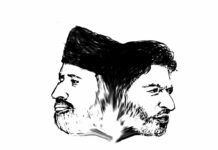Tarique A Bhat
Mujahid Manzil reverberated with the slogans for plebiscite. It was a meeting of the front workers. Shouted a political worker: ‘Rai shumari’. Pat came the reply: ‘Fouran Karav’. Another enthusiast raised the pitch by shouting, ‘Abhi karaav’. An important chapter in Kashmir history or rhetoric in contemporary times?
A legend that had power to pull us in, bypassing our critical filters and controls until recent times. Underpinned by an energetic and enthusiastic embrace of political traditions, Kashmir has seen many generations of fine and dedicated political activists. But now, vocal sloganeering seems a rite of passage. Most workers are disillusioned now with activism and politics, both, feeling alienated and dissatisfied with those representing them and with the cause they represent.
Today’s major political parties have ignored the grassroot workers and use media to gather support, seemingly setting those common people called political activists against the establishment itself. Political establishments have concentrated power in a few people who are either relatives or friends, not as a coincidence certainly! Unfortunately, the real strength of the political activism has never been tapped; be it the political movement of 1931 with inception of Muslim Conference or in 1939 with the organization of National Conference and not even in 1990’s with Hurriyat Conference’s formation.
During the course of decades, political activism got increasingly sidelined. For much of our recent history, people explained many things they couldn’t understand by resorting to narratives of victimization, cause and other fanciful tales.
1990’s came as a cliff hanger which a story needs. It saw a renewed interest of young Kashmiris in a new revolution of ‘Azadi’ leading to what was later experienced as disenchantment of the struggle. Though a great time for the politically inclined but a disruptive act in which the activists pivoted in, history began a new journey. Soon the veil descended once again. The peaceful political activism was once again forgotten.
The impact of political upheavals since last 60 years is invariably misjudged because politicians here measure the future with yardstick from the past. Think of National Conference as stubbornly childish – a self-absorbed, petulant brat, one that doesn’t understand how to play well with its own workers, not to speak of its audiences. Party has no star power. Even the main protagonist of the drama has not been decided-Omer Abdullah, Sheikh Nazir, Mubarak Gul or GN Ratanpuri!
Even political opposition never focused on pragmatic strategies to move forward. They continue to resort to street pressure which requires an ability to mobilize millions of protestors, regularly and on demand, momentary and unsustainable. This tactic certainly attracts media attention but has so far resulted in minimal achievements for the opposition.
All these years of political instability created educational, economic and social needs that are not being met by any political shade. Lack of economic growth and employment opportunities have been pushing communities to the edge. If continued, it would enable the ruling forces to create their own opposition-a process of gradual domination of the political scene. The result would be the stifling of several components of Kashmiri society at a moment of a colossal political transformation.
Fairy tales may end with “happily ever after” but we all know that there is no such thing in reality. We all need to change to stay the same as they say; change is the only permanent and relevant things. Sooner our political representatives understand it, the better it is.















